Unit 5 China and the world Topic 2 He is really the pride of China. Section A 课件 21张PPT
文档属性
| 名称 | Unit 5 China and the world Topic 2 He is really the pride of China. Section A 课件 21张PPT |  | |
| 格式 | zip | ||
| 文件大小 | 3.9MB | ||
| 资源类型 | 教案 | ||
| 版本资源 | 仁爱科普版 | ||
| 科目 | 英语 | ||
| 更新时间 | 2020-02-16 12:30:52 | ||
图片预览

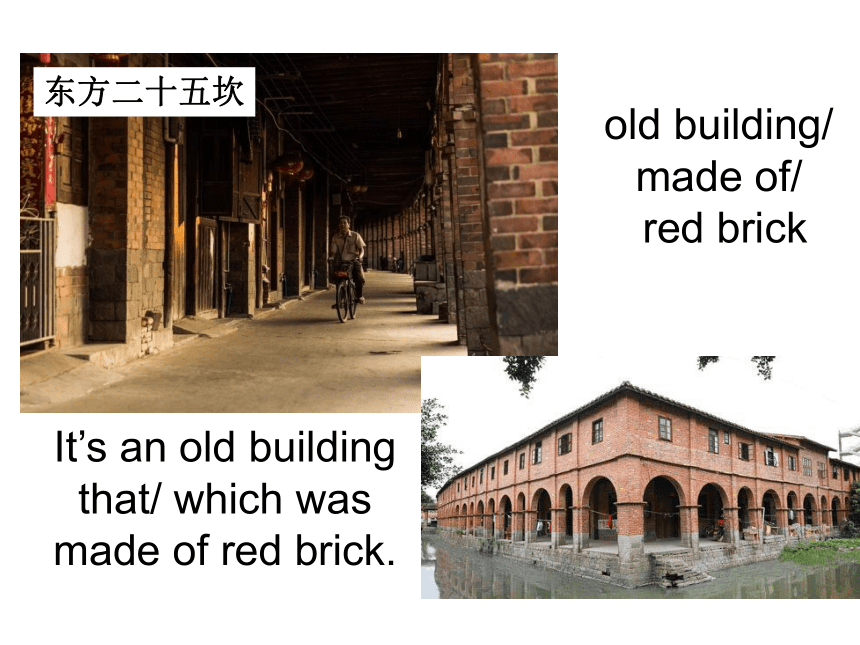
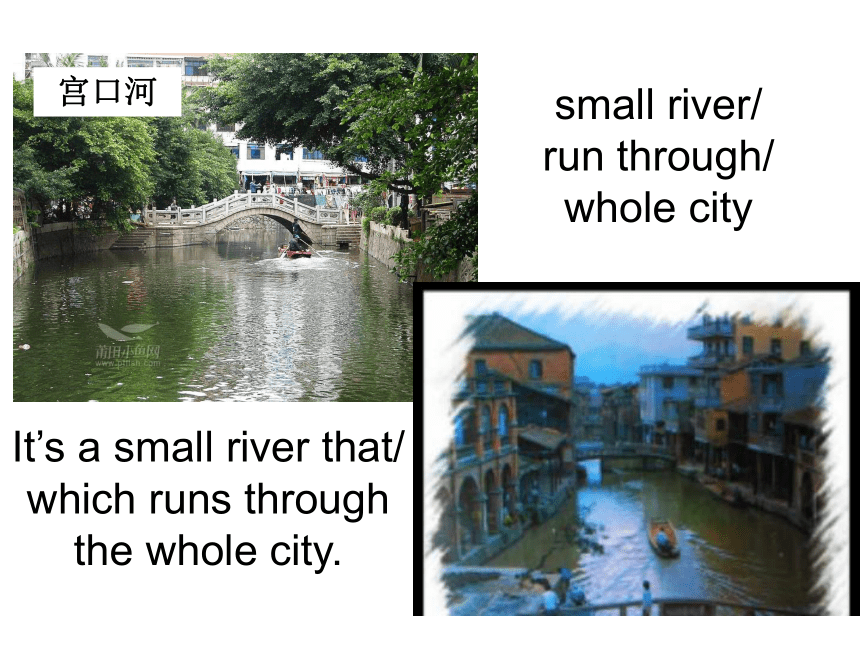

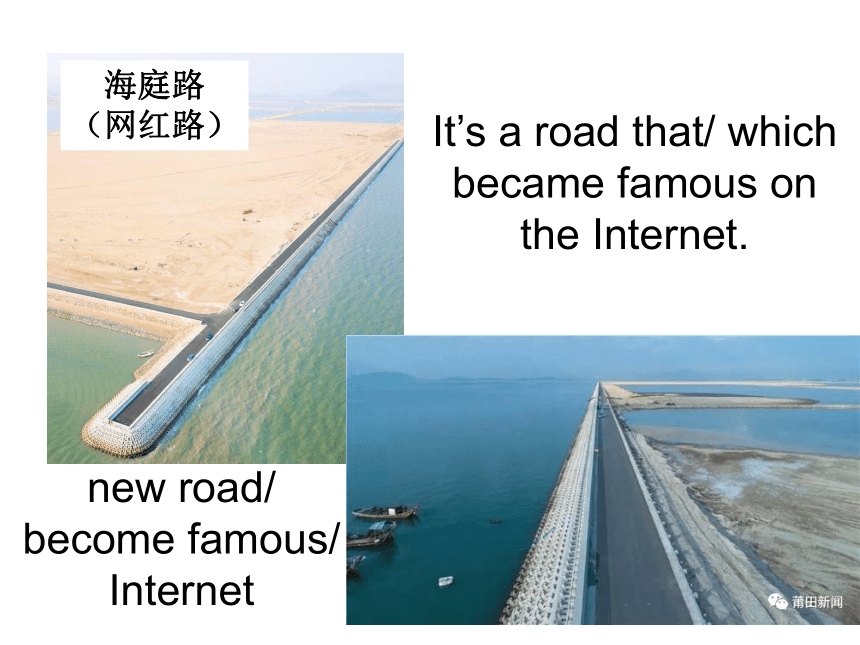
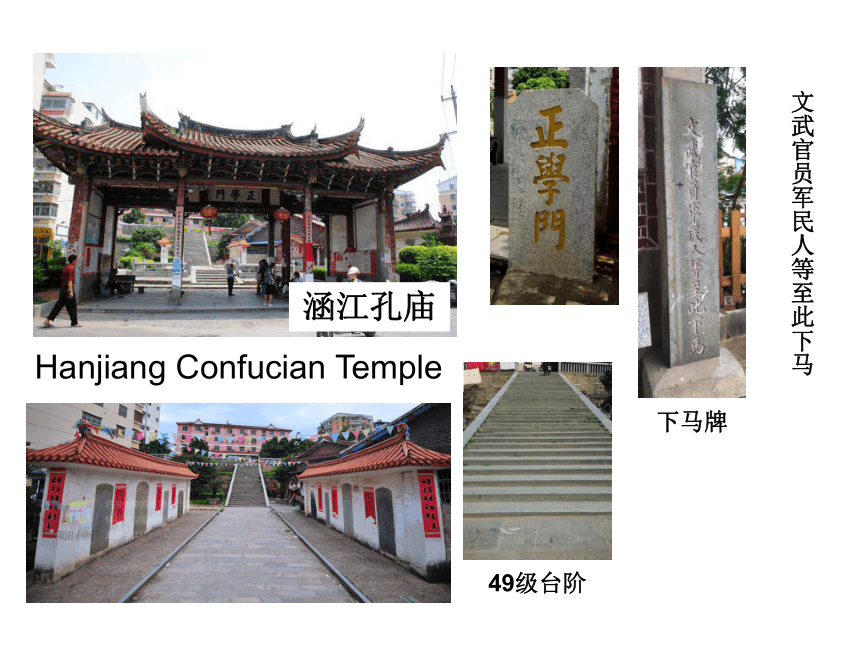

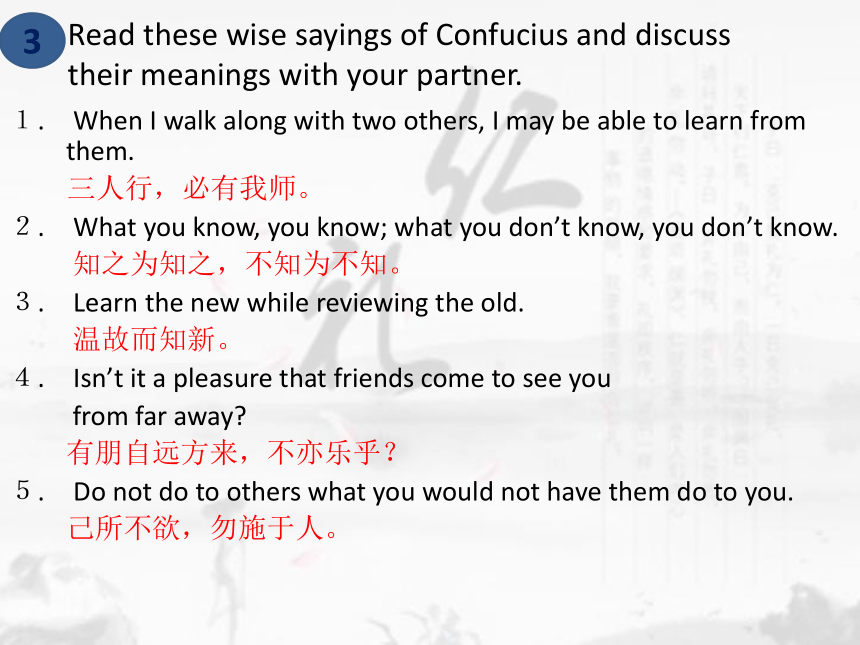
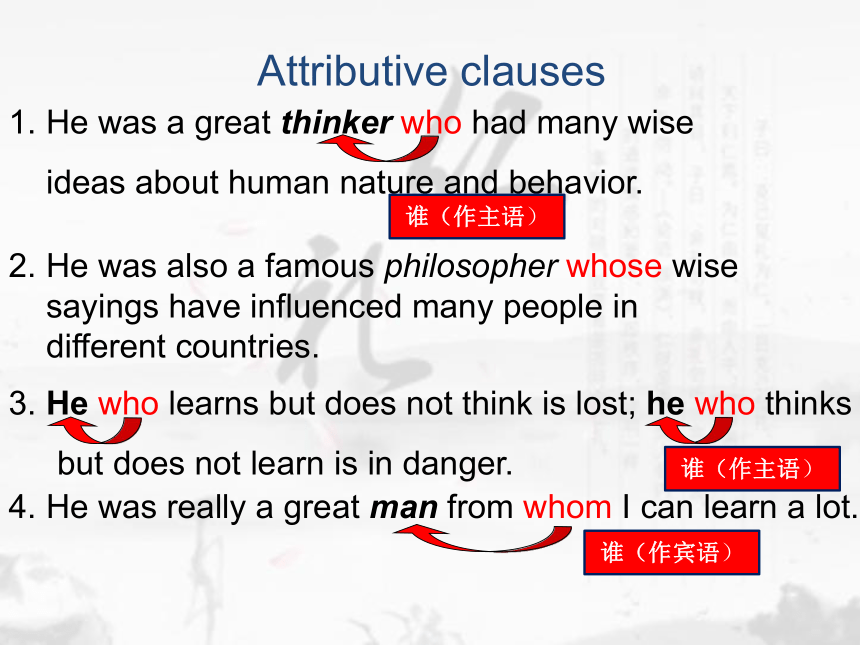
文档简介
(共21张PPT)
Unit 5 Topic 2 Section A.pptx
It’s an old building that/ which was made of red brick.
old building/
made of/
red brick
东方二十五坎
It’s a small river that/ which runs through the whole city.
small river/
run through/
whole city
宫口河
It’s a beautiful lake that/ which attracts many people to enjoy the full moon at night.
beautiful lake/
attract people/
enjoy moon
白塘湖
It’s a road that/ which became famous on the Internet.
new road/
become famous/
Internet
海庭路
(网红路)
文武官员军民人等至此下马
49级台阶
下马牌
涵江孔庙
Hanjiang Confucian Temple
a pioneer in the field of education
??[?pa??'n??(r)]
a thinker with wise ideas
??['θ??k?(r)]
[wa?z]
a famous philosopher
?[f?'l?s?f?(r)]
n. 思想家
adj.明智的
n.哲学家
n. 先锋;拓荒者
Confucius
[k?n'fju:?j?s]
influence
v.影响
['?nflu?ns]
Read these wise sayings of Confucius and discuss
their meanings with your partner.
1. When I walk along with two others, I may be able to learn from them.
三人行,必有我师。
2. What you know, you know; what you don’t know, you don’t know.
知之为知之,不知为不知。
3. Learn the new while reviewing the old.
温故而知新。
4. Isn’t it a pleasure that friends come to see you
from far away?
有朋自远方来,不亦乐乎?
5. Do not do to others what you would not have them do to you.
己所不欲,勿施于人。
3
1. He was a great thinker who had many wise
ideas about human nature and behavior.
2. He was also a famous philosopher whose wise
sayings have influenced many people in
different countries.
3. He who learns but does not think is lost; he who thinks but does not learn is in danger.
4. He was really a great man from whom I can learn a lot.
Attributive clauses
谁(作宾语)
谁(作主语)
谁(作主语)
jsj: 把三部分合成一个动作,同时出现。
jsj: 改为第三个动作。
jsj: 改为第四个动作。
jsj: 把第二句话的三行合并为一个动作2,同时出现。
jsj: 把第二句话的三行合并为一个动作,同时出现。
1. He was also a famous philosopher whose wise sayings have influenced many people in different countries.
2. The Palace Museum has many buildings whose roofs are yellow.
Attributive clauses
whose在句中引导定语从句并在从句中作定语,修饰先行词,其先行词既可以是人,也可以是物。
the philosopher’s / his
某人的(作定语)
of the buildings
某物的(作定语)
jsj: 把三部分合成一个动作,同时出现。
jsj: 改为第三个动作。
jsj: 改为第四个动作。
jsj: 把第二句话的三行合并为一个动作2,同时出现。
jsj: 把第二句话的三行合并为一个动作,同时出现。
Let’s try.
Fill in the blanks with who, whom or whose.
1. Tom is the boy ______ broke the window.
2. This is the house ______ window was broken.
3. The boy to ______ you just talked is Tom.
whom
who
whose
Let’s try.
Write a sentence with attributive clause.
1. The book is mine.
The cover of the book looks newer.
__________________________________
2. The girl lives with us.
The girl’s parents went abroad last year.
__________________________________
The book whose cover looks newer is mine.
The girl whose parents went abroad last year lives with us.
Put the following sentences in the correct order.
( ) A. But Confucius received a good education when he was young.
( ) B. At the age of 55, Confucius began to travel around China. He
tried to search for good rules of behavior.
( ) C. And when he was 17, his mother died.
( ) D. In his thirties, Confucius began to teach. He spent the rest of
his life teaching.
( ) E. Five years later, he passed away (去世).
( ) F. When he was 68 years old, Confucius returned to Lu, his home
state.
( ) G. Confucius was born in the state of Lu in the year 551 B.C.
( ) H. When he was 3 years old, his father died.
7
2
8
1
5
3
6
4
2
in the order of time 按时间顺序
Confucius’ Life Story
When What
Was born
3 years old
Mother died
When he was young Received a good education
Began to teach
55 years old
Returned home
73 years old
In 551 B.C.
17 years old
Father died
In his thirties
68 years old
Traveled around and tried to
search for good rules of behavior
Passed away
over 2000 years ago
in modern history of China
To teach is to get the truth;
To learn is to be an honest person.
good manners
kindness
honest
true
yourself
r
i
g
h
t
Summary
Words and phrases:
Confucius 孔子 pioneer 先锋;拓荒者 thinker 思想家 kindness 仁慈;善良 wise 明智的 philosopher 哲学家
influence 影响 whom 谁(宾格)in the field of 在……领域 B.C. 公元前 in one’s thirties 在某人三十多岁时pass away 去世
Attributive clauses:
1. He was a great thinker who had many wise ideas
about human nature and behavior.
2. He was also a famous philosopher whose wise sayings
have influenced many people in different countries.
3. He was really a great man from whom I can learn a lot.
Sayings:
Summary
1. He who learns but does not think is lost; he who thinks but does not
learn is in danger.
学而不思则罔,思而不学则殆。
2. When I walk along with two others, I may be able to learn from them.
三人行,必有我师。
3. What you know, you know; what you don’t know, you don’t know.
知之为知之,不知为不知。
4. Learn the new while reviewing the old.
温故而知新。
5. Isn’t it a pleasure that friends come to see you from far away?
有朋自远方来,不亦乐乎?
6. Do not do to others what you would not have them do to you.
己所不欲,勿施于人。
Read the conversation in 1a aloud.
Tell about Confucius’ or Tao Xingzhi’s life story.
Search for some information about Zheng He.
Homework
Thank you!
Unit 5 Topic 2 Section A.pptx
It’s an old building that/ which was made of red brick.
old building/
made of/
red brick
东方二十五坎
It’s a small river that/ which runs through the whole city.
small river/
run through/
whole city
宫口河
It’s a beautiful lake that/ which attracts many people to enjoy the full moon at night.
beautiful lake/
attract people/
enjoy moon
白塘湖
It’s a road that/ which became famous on the Internet.
new road/
become famous/
Internet
海庭路
(网红路)
文武官员军民人等至此下马
49级台阶
下马牌
涵江孔庙
Hanjiang Confucian Temple
a pioneer in the field of education
??[?pa??'n??(r)]
a thinker with wise ideas
??['θ??k?(r)]
[wa?z]
a famous philosopher
?[f?'l?s?f?(r)]
n. 思想家
adj.明智的
n.哲学家
n. 先锋;拓荒者
Confucius
[k?n'fju:?j?s]
influence
v.影响
['?nflu?ns]
Read these wise sayings of Confucius and discuss
their meanings with your partner.
1. When I walk along with two others, I may be able to learn from them.
三人行,必有我师。
2. What you know, you know; what you don’t know, you don’t know.
知之为知之,不知为不知。
3. Learn the new while reviewing the old.
温故而知新。
4. Isn’t it a pleasure that friends come to see you
from far away?
有朋自远方来,不亦乐乎?
5. Do not do to others what you would not have them do to you.
己所不欲,勿施于人。
3
1. He was a great thinker who had many wise
ideas about human nature and behavior.
2. He was also a famous philosopher whose wise
sayings have influenced many people in
different countries.
3. He who learns but does not think is lost; he who thinks but does not learn is in danger.
4. He was really a great man from whom I can learn a lot.
Attributive clauses
谁(作宾语)
谁(作主语)
谁(作主语)
jsj: 把三部分合成一个动作,同时出现。
jsj: 改为第三个动作。
jsj: 改为第四个动作。
jsj: 把第二句话的三行合并为一个动作2,同时出现。
jsj: 把第二句话的三行合并为一个动作,同时出现。
1. He was also a famous philosopher whose wise sayings have influenced many people in different countries.
2. The Palace Museum has many buildings whose roofs are yellow.
Attributive clauses
whose在句中引导定语从句并在从句中作定语,修饰先行词,其先行词既可以是人,也可以是物。
the philosopher’s / his
某人的(作定语)
of the buildings
某物的(作定语)
jsj: 把三部分合成一个动作,同时出现。
jsj: 改为第三个动作。
jsj: 改为第四个动作。
jsj: 把第二句话的三行合并为一个动作2,同时出现。
jsj: 把第二句话的三行合并为一个动作,同时出现。
Let’s try.
Fill in the blanks with who, whom or whose.
1. Tom is the boy ______ broke the window.
2. This is the house ______ window was broken.
3. The boy to ______ you just talked is Tom.
whom
who
whose
Let’s try.
Write a sentence with attributive clause.
1. The book is mine.
The cover of the book looks newer.
__________________________________
2. The girl lives with us.
The girl’s parents went abroad last year.
__________________________________
The book whose cover looks newer is mine.
The girl whose parents went abroad last year lives with us.
Put the following sentences in the correct order.
( ) A. But Confucius received a good education when he was young.
( ) B. At the age of 55, Confucius began to travel around China. He
tried to search for good rules of behavior.
( ) C. And when he was 17, his mother died.
( ) D. In his thirties, Confucius began to teach. He spent the rest of
his life teaching.
( ) E. Five years later, he passed away (去世).
( ) F. When he was 68 years old, Confucius returned to Lu, his home
state.
( ) G. Confucius was born in the state of Lu in the year 551 B.C.
( ) H. When he was 3 years old, his father died.
7
2
8
1
5
3
6
4
2
in the order of time 按时间顺序
Confucius’ Life Story
When What
Was born
3 years old
Mother died
When he was young Received a good education
Began to teach
55 years old
Returned home
73 years old
In 551 B.C.
17 years old
Father died
In his thirties
68 years old
Traveled around and tried to
search for good rules of behavior
Passed away
over 2000 years ago
in modern history of China
To teach is to get the truth;
To learn is to be an honest person.
good manners
kindness
honest
true
yourself
r
i
g
h
t
Summary
Words and phrases:
Confucius 孔子 pioneer 先锋;拓荒者 thinker 思想家 kindness 仁慈;善良 wise 明智的 philosopher 哲学家
influence 影响 whom 谁(宾格)in the field of 在……领域 B.C. 公元前 in one’s thirties 在某人三十多岁时pass away 去世
Attributive clauses:
1. He was a great thinker who had many wise ideas
about human nature and behavior.
2. He was also a famous philosopher whose wise sayings
have influenced many people in different countries.
3. He was really a great man from whom I can learn a lot.
Sayings:
Summary
1. He who learns but does not think is lost; he who thinks but does not
learn is in danger.
学而不思则罔,思而不学则殆。
2. When I walk along with two others, I may be able to learn from them.
三人行,必有我师。
3. What you know, you know; what you don’t know, you don’t know.
知之为知之,不知为不知。
4. Learn the new while reviewing the old.
温故而知新。
5. Isn’t it a pleasure that friends come to see you from far away?
有朋自远方来,不亦乐乎?
6. Do not do to others what you would not have them do to you.
己所不欲,勿施于人。
Read the conversation in 1a aloud.
Tell about Confucius’ or Tao Xingzhi’s life story.
Search for some information about Zheng He.
Homework
Thank you!
同课章节目录
- Unit 5 China and the world
- Topic 1 China attracts millions of tourists from a
- Topic 2 He is really the pride of China.
- Topic 3 Now it is a symbol of England.
- Unit 6 Entertainment and Friendship.
- Topic 1 I would rather watch sports shows than tho
- Topic 2 Who is your favorite character in literatu
- Topic 3 I will remember our friendship forever.
